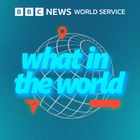
What in the World
Jan 9, 2025
Carbon offsetting is a way to try to balance carbon emissions. It’s when an individual, company or governments invest in projects that try to take carbon dioxide out of the atmosphere, to compensate for their own carbon footprint.
Many of the schemes - like planting trees, protecting forests or switching to cleaner fuels - are set up in places like Africa or South America.
But how do these schemes work in practice? A paper published in 2024 in the science journal Nature found that few schemes led to a “real emission reductions“. Are they just a distraction or worse - a con? BBC climate and science reporter Esme Stallard answers our questions.
And Joshua Gabriel Oluwaseyi, a 24 year old climate activist in Nigeria, gives us his view on the impact carbon offsetting schemes have had in Nigeria - and whether he thinks they are worth doing.
Instagram: @bbcwhatintheworld Email: [email protected] WhatsApp: +44 0330 12 33 22 6 Presenter: Hannah Gelbart Producers: Julia Ross-Roy and Maria Clara Montoya Video Journalist: Baldeep Chahal Editor: Verity Wilde

